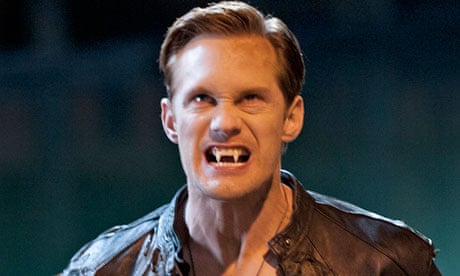SPOILER ALERT: this blog contains plot details up to and including the end of season six of True Blood.
"Is that even on any more?" is a question that speaks volumes about a show's decline, but the news that HBO's True Blood is due to end after its seventh season has largely been met with an anaemic shrug. Grantland suggest that the show "died a long time ago", while Gawker referred to it as "a long-running porn tape with a complicated plot".
I'm a fan, but I know it's the right time to put the show to bed. Season six, which has just finished in the US, held up surprisingly well – in particular, the huge massacre at Vamp Camp and the clever use of a time-jump in the finale, both of which mean that the show will head into the final 10 episodes next year with a lighter, tighter cast, fresh storylines and a renewed focus.
It was a deserved victory lap, following a disastrous season five, which suffered in several areas. The lack of a centralised "big bad" compared to previous seasons (season one's serial killer, the immortal maenad in season two, and so on) made the run feel too vast and unconnected. Instead we had the Vampire Authority, a bumbling collection of idiots, and the "villain" Lilith (a vision which appeared when vampires got high) who wasn't corporeal enough to be considered a threat.
Some fans also disliked how the show was deviating from the original Sookie Stackhouse books. Initially, creator Alan Ball artfully balanced source material with the need for it to work as a TV show. He let Lafayette live at the end of season one, though the character is killed off in the novel. He also managed to give depth to characters created purely for the show, such as Jessica. But in season five, it felt like Ball had run out of ideas and didn't know what to do next, picking up and dropping confusing plotlines (werepanthers? Sookie's kind-of-psychic cousin?) seemingly at random. He stepped down as showrunner before season six began.
Invigorated, perhaps, by his replacement Brian Buckner, season six largely felt like a return to form. The introduction of the Vamp Camp, which saw several main vampires imprisoned and in peril, was a smart move. The season culminated in a bloody, brutal and brilliant massacre, and we waved farewell to Luna, Terry, Nora and Steve.
This all leaves me optimistic for True Blood's final curtain. With the deadwood swept away, the show will no longer have to juggle its many unconnected strands, giving it more time to focus on tying up loose ends once and for all. (A Sopranos-style open ending just wouldn't feel right here – True Blood has never gone in for subtle.) And ending on a high – even after its numerous lows – is a better option than staggering limply towards the True Death. Just one request: no more of those awful werewolves.

Comments (…)
Sign in or create your Guardian account to join the discussion